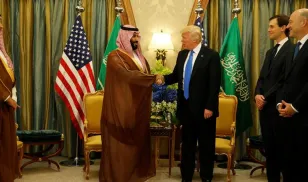


Saudi Arabia
Saudi Arabia’s absolute monarchy restricts almost all political rights and civil liberties. No officials at the national level are elected. The regime relies on pervasive surveillance, the criminalization of dissent, appeals to sectarianism and ethnicity, and public spending supported by oil revenues to maintain power. Women and members of religious minority groups face extensive discrimination in law and in practice. Working conditions for the large expatriate labor force are often exploitative.
Research & Recommendations
Saudi Arabia
| PR Political Rights | 1 40 |
| CL Civil Liberties | 8 60 |
Overview
Saudi Arabia’s absolute monarchy restricts almost all political rights and civil liberties. No officials at the national level are elected. The regime relies on pervasive surveillance, the criminalization of dissent, appeals to sectarianism and ethnicity, and public spending supported by oil revenues to maintain power. Women and members of religious minority groups face extensive discrimination in law and in practice. Working conditions for the large expatriate labor force are often exploitative.
In countries where democratic forces have come to power after periods of antidemocratic rule, the new governments should pursue an agenda that protects and expands freedoms even as it delivers tangible economic and social benefits to citizens.
These countries must act swiftly to release all political prisoners, build or revitalize democratic institutions, reform police and other security forces, organize and hold competitive multiparty elections, and ensure accountability for past human rights violations.
In countries where there has been significant erosion of political rights and civil liberties, policymakers, legislators, jurists, civic activists, and donor communities should work to strengthen institutional guardrails and norms that serve to constrain elected leaders with antidemocratic or illiberal aims.
Saudi Arabia
| A Obstacles to Access | 13 25 |
| B Limits on Content | 7 35 |
| C Violations of User Rights | 5 40 |
Political Overview
Saudi Arabia’s absolute monarchy restricts almost all political rights and civil liberties. No officials at the national level are elected. The regime relies on pervasive surveillance, the criminalization of dissent, appeals to sectarianism and ethnicity, and public spending supported by oil revenues to maintain power. Women and members of religious minority groups face extensive discrimination in law and in practice. Working conditions for the large expatriate labor force are often exploitative.
Freedom of expression online has been and is increasingly under attack as governments shut off internet connectivity, block social media platforms, and restrict access to websites that host political, social, and religious speech. Protecting freedom of expression will require strong legal and regulatory safeguards for digital communications.
Governments should encourage a whole-of-society approach to fostering a high-quality, diverse, and trustworthy information space. The Global Declaration on Information Integrity Online identifies best practices for safeguarding the information ecosystem, to which governments should adhere.
Comprehensive data-protection regulations and industry policies on data protection are essential for upholding privacy and combating disproportionate government surveillance, but they require careful crafting to ensure that they do not contribute to internet fragmentation—the siloing of the global internet into nation-based segments—and cannot be used by governments to undermine privacy and other fundamental freedoms.

The Saudi Arabian government is perhaps the best known in the world for targeting its nationals abroad. The brutal 2018 murder and dismemberment of dissident and journalist Jamal Khashoggi inside the country’s Istanbul consulate brought transnational repression into popular awareness.
Khashoggi’s killing was not an isolated event, but rather the outcome of an increasingly physical, targeted campaign against critics and former insiders, including members of the royal family, that has rapidly escalated since Crown Prince Mohammed bin Salman began his rise to power in 2015. This campaign has included extensive use of spyware, proxy punishment, detentions, assaults, and renditions in nine countries spanning the Middle East, Europe, North America, and Asia.
Like-minded governments and international organizations should work together to highlight the threat of transnational repression and establish international norms for addressing it.
This includes agreeing on a common definition of transnational repression, and prohibiting the use of Interpol notices on their own to deny immigration or asylum benefits or conduct arrests.
Among other tactics, governments should deploy a robust strategy for targeted sanctions against perpetrators of transnational repression.




